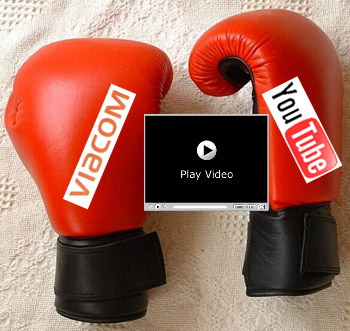One of the biggest media conglomerate, Viacom’s battle with the largest video sharing website, Youtube for a $1 Billion Lawsuit went public this thursday at the Federal Court.
The whole case revolves around the arguments made by both the Giants and most exigent part constituent of the case is the DMCA (Digital Millennium Copyright Act of 1998).
The DMCA policy gives refuge to the Content and Service Providers from the Copyright acts as long as the Providers are unaware of fact that infringing content is being uploaded and stored and that the Provider’s revenues are not being accelerated because of such activities.
 Viacom states that Youtube is defying the DMCA Policy, simply because Youtube’s founders and it’s parent conglomerate’s conduct is not in accordance with the conditions required for DMCA to provide shelter to a service provider. On the other hand, we have Google with a 100 page court file stating that Viacom’s arguments are counterfactual and that it completely agrees with the DMCA policy.
Viacom states that Youtube is defying the DMCA Policy, simply because Youtube’s founders and it’s parent conglomerate’s conduct is not in accordance with the conditions required for DMCA to provide shelter to a service provider. On the other hand, we have Google with a 100 page court file stating that Viacom’s arguments are counterfactual and that it completely agrees with the DMCA policy.
What Viacom Says
The Media giant states that Youtube is not in consonance with DMCA policy as it’s founders were aware of such infringements taking place (Strike 1), Google was also aware of this certainty before acquiring the young startup for a massive amount of $1.65 Billion (Strike 2) and conclusively when they questioned Youtube and Google employees, no one seems to remember anything of such being talked about in the company (Strike 3).
What Google Says
Only service remaining to be released by Google is surely Google Law, to fight all the lawsuits pending against the Big “G”. Currently Google is facing lawsuits all over the globe for Privacy Breaches for two of the biggest service, Google Maps and Google Buzz. This time it could turn nasty with Viacom. Google argues by saying that video shows were itself uploaded by third party companies on behalf of Viacom and then it is treating with the Video Sharing website with DMCA takedown requests.
The matter is not as lucid as it appears to us. Firstly, both the companies have arguments which overlap and thus making the matter even more difficult for the judge to provide a judgement in favor of any of the parties. Viacom takes a direct shot stating that Youtube Founders, specifically Jawed Karim had the knowledge about the infringing content being uploaded during the early days of YouTube during the dawn of the startup in 2005 and Viacom provides a part of the mail conversation between Jawed and the co-founder Steve Chen.
‘Jawed, please stop putting stolen videos on the site. We’re going to have a tough time defending the fact that we’re not liable for the copyrighted material on the site because we didn’t put it up when one of the co-founders is blatantly stealing content from other sites and trying to get everyone to see it.’ ~ Steve Chen
Viacom accuses that the founders were even sure that 80% of their web traffic in the earlier days was dependent on the pirated videos and so they also used it as a method to increase financial gains via Advertising, which actually did not happen though.
Google argues that clearly pointing out that Viacom itself was involved in uploading the infringing videos and that it had hired marketing companies to do that task on their behalf because YouTube was an effective appliance for Promotion of Viacom’s shows. Google in it’s court file also includes that there is now way for the website to find if the content uploaded was authorized or not.
This case could also decide the future of video sharing, and finally prove who is responsible for taking care of the Copyrights, the Service providers or the Content creators?




659674 344647I appreciate you taking the time to talk about them with people. 920296